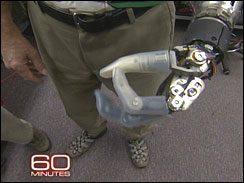
60 Minutes: Pentagon Is Working To Develop A Life-Changing, High Tech Prosthetic Arm
(CBS) When Americans are wounded in Afghanistan or Iraq, no expense is spared to save their lives. But once they're home, if they have suffered an amputation of their arm, they usually end up wearing an artificial limb that hasn't changed much since World War II.
In all the wonders of modern medicine, building a robotic arm with a fully functioning hand has not been remotely possible.
But as 60 Minutes correspondent Scott Pelleyreports, that is starting to change. One remarkable leap in technology is called the DEKA arm and it's just one of the breakthroughs in a $100 million Pentagon program called "Revolutionizing Prosthetics."
Fred Downs has been wearing the standard prosthetic arm since 1968, after he stepped on a landmine in Vietnam.
"It's a basic hook. And I can rotate the hook like this and lock it," Downs told Pelley, demonstrating the limited movement ability of his prosthetic arm. "In those days they didn't have a lot of sophistication about it. They fit you and say, 'This is your arm, this is your leg.' And it was the best technology in those days and you just had to make yourself learn how to use it and I did."
Today, Downs is the head of prosthetics for the Veterans Health Administration. He told Pelley the technology used for his arm was developed during the World War II era.
"There's a hook, something out of Peter Pan. And that's just unacceptable," Dr. Geoffrey Ling, an Army colonel and neurologist who's leading the Revolutionizing Prosthetics program, told Pelley
Col. Ling is a physician with big dreams and little patience, especially when touring Walter Reed Army Medical Center and meeting the troops he's working for. "We have a saying in the military, 'Leave no one behind.' And we are very serious about that. And that doesn't mean just on the battlefield, but also back at home," he said.
Ling told Pelley they've made great strides in artificial legs, but a good arm has never been within their grasp. "If you look at your hand, it's an incredibly complex piece of machine. What nature provides us is extraordinary. The opposable thumb, the five finger independently moving, articulating fingers. It's fantastic what this does."
"And when you lose your hand you've lost something that makes you human," Pelley remarked.
"You're so right Scott. Because, think about what makes us separate from every other animal species. We have an opposable thumb. That is, in fact, what makes us human," Ling said.
Ling is determined to give that humanity back. His project is run out of DARPA, the Defense Advanced Research Projects Agency - the same group that oversaw the creation of night vision, stealth aircraft, and GPS.
Ling told Pelley it's a very large scale project. "It is very much like a Manhattan Project at that scope. It is over $100 million investment now. It involves well over 300 scientists, that is engineers, neuroscientists, psychologists."
One of the scientists Ling asked to join the team is Dean Kamen, a sort of rock star in the world of inventors. His creations include dozens of medical devices, and the Segway.
They are inventions which have made him a multimillionaire.
"When the folks from the Defense Department came to this office and said, 'Here's what we need,' what did they tell you?" Pelley asked.
"We want these kids to have something put back on them that will essentially allow one of these kids to pick up a raisin or a grape off a table, know the difference without looking at it. That is an extraordinary goal," Kamen explained.
"He basically said, 'You're crazy.' That’s what he told us," Ling remembered. "He said flat out, he and he himself, who's a crazy guy himself, I mean he is very innovative thinking. He's a brilliant man, totally brilliant man, but mad scientist."
Kamen told Pelley he thought the Pentagon and DARPA were unbelievably optimistic in their expectations and that he told them that.
"He said to us, he said, 'I can do my, you're crazy. But, we're willing to rise to this, rise to the challenge because it’s important,'" Ling remembered.
Kamen took 60 Minutes behind the scenes at DEKA, his company in New Hampshire, to show Pelley how inspiration becomes invention.
"Engineers design a part on a computer, he fires it up here on our network," Kamen explained.
To continue reading click here to view the entire story.